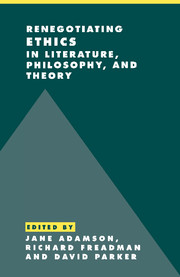2 - Martha Nussbaum and the need for novels
Published online by Cambridge University Press: 04 February 2010
Summary
This chapter is about one of Martha Nussbaum's central claims in Love's Knowledge: that there are some moral views which can be adequately expressed only through novels, and that therefore the study of such novels belongs within moral philosophy.
That claim is the second of the book's main claims. The first is that what view of life, of how to live, is conveyed by a text depends in part on formal features of that text. If we accept that point, it follows that formal features of various different sorts of literary texts may fit them for the expression of various views of life that cannot be expressed in other ways.
Suppose a philosopher seriously doubted both of Martha Nussbaum's main claims. Perhaps s/he doubts whether there are any moral views that only literary narratives of some kind can convey. How could we investigate that issue within moral philosophy except by giving careful attention to such texts, except by trying to see how their form was, or whether it was not, related to the moral thought conveyed by the text? It seems, then, that a doubt whether form and content are related in the way Professor Nussbaum thinks they are would commit us, just as much as would acceptance of her claims, to including an open-minded study of literary texts within moral philosophy.
- Type
- Chapter
- Information
- Publisher: Cambridge University PressPrint publication year: 1998
- 6
- Cited by



